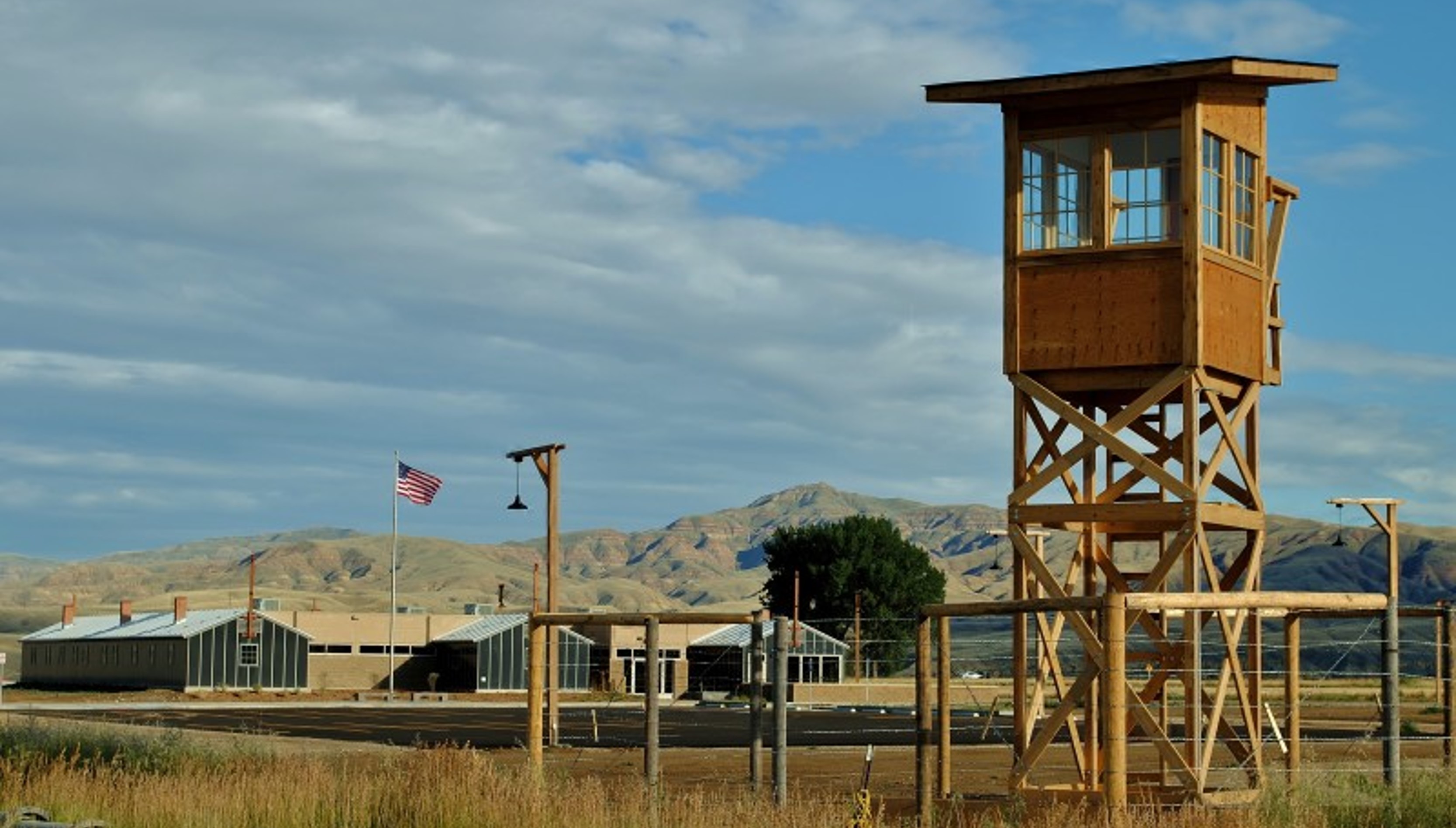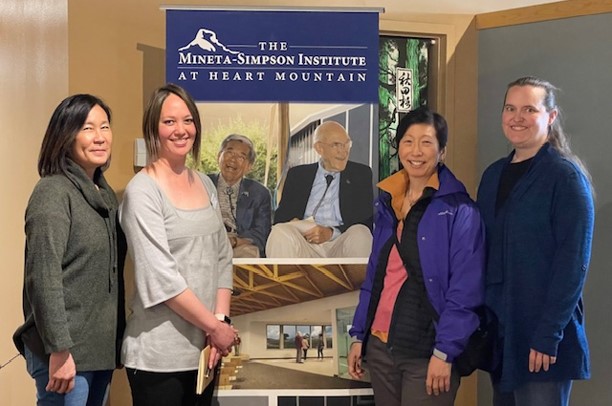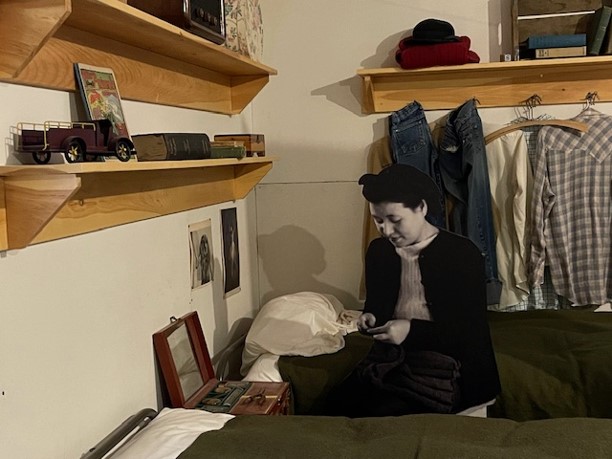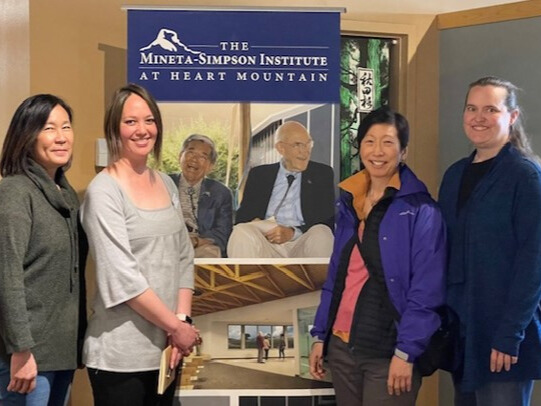
Near the entrance to the Heart Mountain World War II National Historic Landmark between Cody and Powell, Wyoming, a guard tower that once stood above 10,000 incarcerated Japanese Americans came into view. In that instance, the significance of this place became a concrete reality. The Heart Mountain site was one of 10 confinement camps that incarcerated Japanese American across the US during WWII. Following Japan’s attack on Pearl Harbor on December 7, 1941, President Franklin D. Roosevelt issued Executive Order 9066, which led to nearly 120,000 people of Japanese ancestry – two-thirds of whom were American citizens – being forced out of their homes and into camps. Today, it is a site of the Heart Mountain Interpretive Center housing a museum and a library and the Mineta Simpson Institute.

To commemorate the injustice Japanese Americans had endured and coinciding with Asian American and Pacific Islander Heritage Month, three women made a pilgrimage to Heart Mountain on May 10, 2024. Traveling together were Sara Kim, UWSOM’s Associate Dean for Educational Quality Improvement, and Ellen Sato Faust, Executive Director of the Bainbridge Island Japanese American Exclusion Memorial in Washington. April French, WWAMI’s Learning Specialist, who grew up in Powell and whose grandparents homesteaded at Heart Mountain after WWII, served as the local guide. Hosting them when they arrived at the site was Aura Sunada Newlin, the Executive Director of the Heart Mountain Wyoming Foundation. She is a descendant of a Heart Mountain incarceree and a fourth-generation Wyomingite.
April explains the context of how the trip came about: “Ellen hosted Sara and me when we visited the Bainbridge Memorial in November 2023. This is where the first group of Japanese Americans were rounded up and shipped to confinement camps. We then hatched a plan for us to make a pilgrimage to Heart Mountain. It was a true honor to learn from them as they experienced the land where this historic injustice took place.”
Coming from diverse backgrounds, the three women who made this journey share a common passion to speak the truth of what happened to fellow citizens. “What took place on Bainbridge Island and Heart Mountain must never happen again, so education and advocacy are key,” says April. Ellen, a third-generation Japanese American whose family was incarcerated at the Tule Lake concentration camp in California, remarks, “The events that took place in Bainbridge Island, Heart Mountain, Tule Lake, and all the other incarceration sites once seemed like obscure history lessons. Now, with these historic places restored and enriched with personal stories from that time, they have become much more tangible. Standing at the camp site and seeing Heart Mountain in the distance deeply moved me, making the history feel profoundly real and personal.”
As a Korean American, Sara’s interest in the history of Heart Mountain sparked when learning about the recently completed Mineta-Simpson Institute at the Interpretive Center. The long, collaborative friendship between Norm Mineta (1931-2022), a Democrat from California who served in the US Congress and as Secretary of Transportation and Secretary of Commerce, and Alan Simpson, a retired three-term Republican US Senator from Wyoming, birthed the vision for the Institute.

The two met at the Heart Mountain confinement camp during the war – Mineta, a Boy Scout in the camp and Simpson, a Boy Scout living in Cody. They were paired up when Simpson’s Boy Scout troop entered the camp for a one-day jamboree with the Japanese American Boy Scouts. The memory of building a pup tent together as boys was rekindled when they encountered each other again as adults in public service. The two were instrumental in securing the passage of the Civil Liberties Act of 1988, which provided restitution for Japanese American survivors of WWII incarceration and advocated for the government to ensure public education on this history.
In honor of these men’s long, bipartisan friendship, the Mineta-Simpson Institute was built to foster dialogue across difference. It will have its grand opening in July 2024, during the annual Heart Mountain Pilgrimage, when former incarcerees and their families come together to celebrate their resilience in the midst of injustice.
“During the Covid-19 pandemic, I saw Asian women in my own neighborhood being harassed and even physically attacked,” Sara continues, “The indiscriminate abuse made me fearful of going outside. It was around this time when I learned about the inspiring story of the Mineta-Simpson Institute. I then resolved to becoming a part of a vision instead of victimhood.
“I teach conflict management to new department chairs and associate deans through the AAMC (Association of American Medical Colleges) Organizational Leadership in Academic Medicine. In my session, I share with the leaders the history of Heart Mountain and highlight the Mineta-Simpson Institute as an example of what may be possible against the backdrop of hatred. Without the Cody scoutmaster, Glenn Livingston, who obtained consent from parents of 23 out of 25 Boy Scouts to enter the camp, the vision for the Institute would have never been born. He was the only leader in Wyoming who agreed to take his Boy Scouts to the camp while other leaders declined the Japanese American scoutmaster’s request for a jamboree in the camp. Livingston is quoted to have said, The boys in the camp wear the same uniform, salute and fly the same flag and say the same scout oath.
“To me, Livingston epitomizes the essence of what a leader should be–to uphold the humanity in all even if the prevailing societal norms deny it in selected groups of people.”
Ellen concludes, “The origin story of the Mineta-Simpson friendship is a true testament to the power of human connection, the ability to build trust from shared experiences, and the value of cooperation that we should all take to heart. It is truly remarkable what the Heart Mountain team has accomplished within such a compressed timeframe. We share their vision of creating a space where people can engage in meaningful discourse in a setting that continually reminds us of the importance of thoughtful action in preventing and protecting others from injustice.”
By Sara Kim, Ph.D, Associate Dean for Educational Quality Improvement, Ellen Sato Faust, Executive Director of the Bainbridge Island Japanese American Exclusion Memorial and April French, Learning Specialist, University of Wyoming, Laramie.

